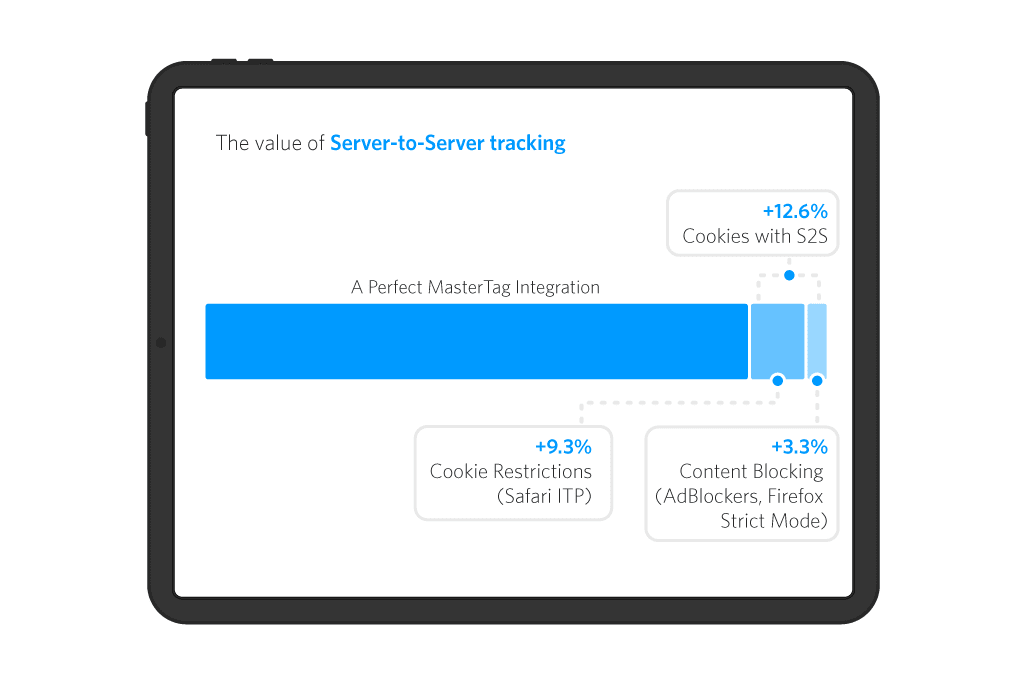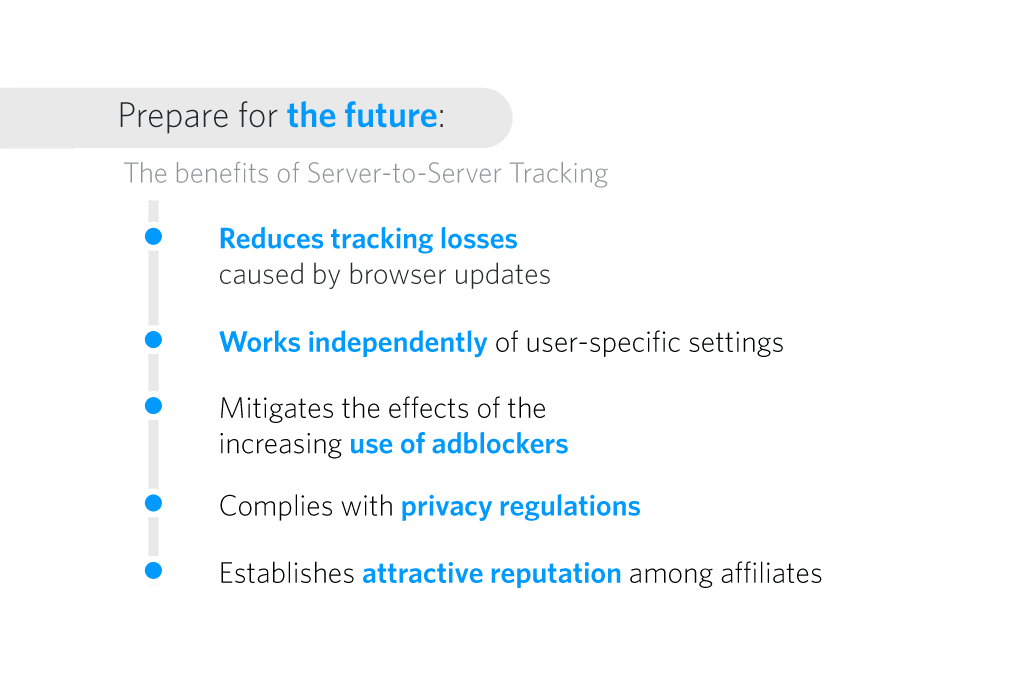Track better and build better partnerships with server-to-server tracking
Written by Sylwia Loonan on 5 minute read
Learn how to accurately attribute channels and reduce revenue loss caused by browser updates and ad-blocker technologies.

When tracking sales becomes a gamble that has more to do with chance than with your tracking set-up and your business’ success depends on browser settings, the use of adblockers, and other extensive user privacy settings, it's time to implement server-to-server tracking.
Why is server-to-server tracking important?
Mainly due to data protection and privacy of internet users. Adblockers and browsers are increasingly blocking known advertising and analytics servers. In addition, third-party tracking within the browser is becoming more unreliable because of recent privacy measures such as Apple’s Intelligent Tracking Prevention (ITP) and Firefox's Enhanced Tracking Protection (ETP).
Both block third-party cookies and are designed to limit the sharing of personal data. The same applies to Google, which is following Safari and Firefox, announcing it will introduce restrictions on third-party cookies.
Additionally, the use of adblockers is steadily increasing. Over 40% of internet users worldwide use an adblocker extension to reduce the number of ads displayed. And the younger the user, the more likely an adblocker is installed.
This means the data quality of browser-based tracking is highly dependent on external factors like user and browser settings. Therefore, fully browser-based tracking is likely to lead to lost sales and revenue.
Why should I implement server-to-server tracking?
By implementing server-to-server tracking, businesses can accurately attribute transactions to the correct channels, resulting in a more efficient budget allocation that rewards publishers fairly, while also preventing revenue loss from browser updates, adblocker technologies, and user settings. This makes server-to-server tracking essential for businesses looking to maximize their profits and optimize their advertising strategies.
As server-to-server tracking does not allow invasive profiling, it is not affected by browser tracking prevention or adblocking technologies. Dependencies on user settings and browser extensions are minimized. This gives advertisers greater control over their data and its use while complying with data protection regulations.
In affiliate marketing, there is no intrusive profiling as with other marketing channels. That’s why this channel can use server-to-server tracking, which has a limited scope. Unlike third-party cookies and tracking pixels, which are often abused to track consumers across the internet and create intrusive profiles, server-to-server tracking measures cookies and transactions only on the advertiser's site.
The two main threats server-to-server tracking mitigates are Cookie Restrictions (limits click cookies) and Content Blocking (blocks MasterTag tracking)
- Cookie restrictions:
Browsers like Safari with ITP restrict when cookies are set, who can read the cookies and how long they are valid. Although the sales information is still available via the Awin MasterTag, the sale cannot be attributed to a publisher because of missing click cookie information. - Content blocking:
Content blocking is usually hard-coded lists of URLs that are blocked from loading resources such as scripts (Awin MasterTag). If the loading of conversion pixels is completely blocked, neither the cookies nor the sales information is available.
How does server-to-server tracking work?
Sever-to-server tracking uses a first-party cookie whose value is only exchanged between the advertiser and Awin. It is a conversion tracking method where the advertiser's servers communicate directly with Awin's servers to pass on conversion data. Unlike more intrusive marketing channels, this conversion data represents to Awin the publisher who initiated the sale, not the individual consumer.
With server-side tracking, the data is only available for use by the advertiser and not shared across many websites. This makes server-to-server tracking privacy compliant and meets the general data protection regulations (GDPR).
Does this mean I can remove the browser-side tracking?
No. The "hybrid" integration of browser- and server-side tracking is the more robust and future-proof tracking solution. Server-side tracking is an addition to browser-side tracking and is not intended to replace it. Server-to-server tracking and the MasterTag work in two different places and are often managed by different teams. So it makes sense to have a backup, in case something goes wrong.
If that's not reason enough, here are some additional benefits of integrating our browser-side solution:
- Solutions Marketplace: Availability of our third-party optimization plugins with just one click.
- Ease of install: Advertisers can easily install the MasterTag, which shortens the time to launch the programme. Server-to-server tracking integration often requires developer resources and is more time-consuming.
- Ease of debugging: It is easier for technical teams to troubleshoot tracking issues via the MasterTag, as tracking calls and their structure can be seen in the browser.
What does this mean in numbers?
We analysed 150,000 tracking calls looking at advertisers that are integrated with the MasterTag. This research is based on a perfect MasterTag integration on the advertiser’s site.
We saw 12.6% more cookies with server-to-server tracking implemented - of which 9.3% are due to cookie restrictions in browsers like Safari and 3.3% are related to content blockers like AdBlock+ and Ghostery. This shows the strength of this integration method, which will continue to grow in importance with the limitations of browser-side tracking.
Looking at this in more detail, we found that 12.6% of tracking calls contained a cookie in the server-to-server call that was not present in the MasterTag call. In addition, we looked at how often we did not see a MasterTag call, meaning the MasterTag was entirely blocked from loading. This accounted for 3.3% of the 12.6%. We can attribute this to the differences between cookie restrictions and content blocking.
 We know a perfect MasterTag integration is not always the case with advertisers. Often landing pages are overlooked during implementation, the pixel is placed sub-optimally on the shop page or the MasterTag is displayed conditionally, at times with incorrect logic. With such customers, the number of cookies recorded via server-to-server tracking would be significantly higher.
We know a perfect MasterTag integration is not always the case with advertisers. Often landing pages are overlooked during implementation, the pixel is placed sub-optimally on the shop page or the MasterTag is displayed conditionally, at times with incorrect logic. With such customers, the number of cookies recorded via server-to-server tracking would be significantly higher.
Although switching to server-to-server tracking can be time-consuming and expensive, as the numbers demonstrate, the benefits far outweigh the cost:
What do I need to do next?
Next, you should check your tracking setup. If your programme has a high percentage of third-party cookie sales, now is the best time to talk to your Awin contact about possible solutions such as 1st-party tracking and server-to-server tracking.
The technical evolution towards higher privacy standards and user protection is not going to stop or slow down. Server-side tracking is the online tracking of the future. We recommend adapting tracking to be resilient to the increasing restrictions and changes of browser providers.
